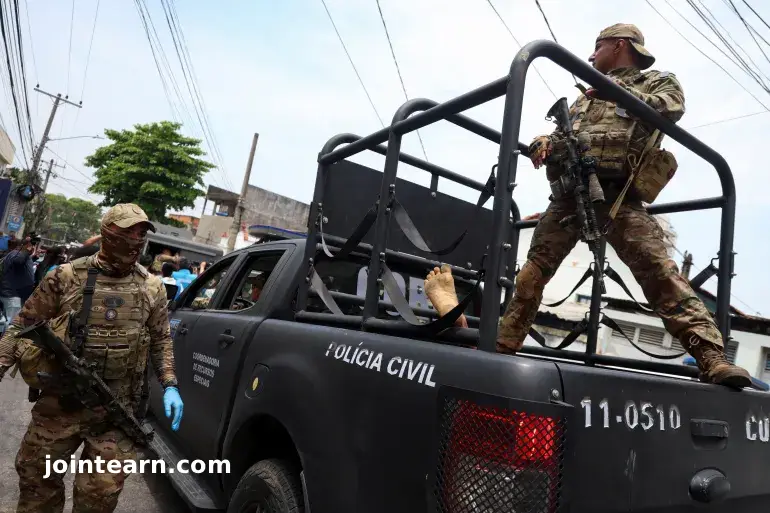
A large-scale police operation in Rio de Janeiro’s favelas has left at least 64 people dead, including four police officers, in what officials are calling the most lethal police action in the history of the state. The unprecedented death toll has sparked outrage among human rights organizations and reignited debate about Brazil’s long-running war on organized crime.
The raid, known as Operation Containment, targeted members of the Comando Vermelho (Red Command) — one of Rio’s most powerful drug trafficking organizations. According to state officials, the offensive involved more than 2,500 police officers, supported by armoured vehicles and helicopters, in coordinated assaults across the Penha and Alemao favela complexes, two densely populated, low-income neighborhoods in northern Rio.
Governor Defends Police Action Amid Rising Criticism
In a video statement released Tuesday, Rio de Janeiro Governor Claudio Castro said police had “neutralized” 60 suspected criminals and detained 81 people, adding that dozens of weapons had been seized.
“What do we want? A Rio de Janeiro and a Brazil free of crime,” Castro declared. “We will not retreat, because the more public safety works, the freer you and your family will be.”
However, the high civilian death toll has raised international concern, with observers labeling the incident the bloodiest police raid in Brazil’s history. Residents reported intense gunfire, road closures, and stray bullets injuring bystanders. Many families in the affected favelas claimed they were unable to reach victims’ bodies for hours as police sealed off the area.
Operation Containment: The Largest Offensive Against Comando Vermelho
Officials said the operation aimed to dismantle the territorial control of Comando Vermelho, which dominates large sections of Rio’s urban sprawl. The group, which emerged in the 1980s, is considered the most powerful criminal faction in Brazil, with deep ties to international cocaine trafficking networks that extend through Colombia and the Amazon Basin.
Governor Castro described Operation Containment as the largest security initiative ever conducted against the organization.
“The operation aims to combat the territorial expansion of the Comando Vermelho and capture criminal leaders from Rio de Janeiro and other states,” he wrote on X (formerly Twitter).
Yet the operation’s brutality — and the number of fatalities — has intensified criticism that Rio’s militarized policing strategy is creating more violence than it prevents.
Widespread Control of Organized Crime in Rio
Experts estimate that around 60% of Rio de Janeiro’s territory is controlled either by drug gangs or paramilitary militias. The militias, often composed of former police officers, charge residents “security fees” and operate as parallel authorities in many communities.
“Sixty percent of the state is under control of gangs or militias,” explained Monica Yanakiew, Al Jazeera’s correspondent in Rio. “These groups have become embedded in the city’s social and economic fabric.”
In 2023 alone, Brazil recorded over 180,000 cocaine-related incidents and seized nearly 130,000 kilograms (286,600 pounds) of narcotics. The country ranks second globally in cocaine consumption, behind only the United States.
History of Deadly Police Raids in Brazil’s Favelas
Deadly police raids are a recurring feature of life in Rio’s marginalized communities. In 2024, about 700 people were killed during police operations — nearly two per day.
The previous record for fatalities occurred in 2021, when 25 people died during a police incursion into the Jacarezinho favela, another stronghold of organized crime.
Images from that raid showed homes riddled with bullet holes and blood flowing through the streets — scenes that have now been echoed in Alemao and Penha. Witnesses from Tuesday’s operation described similar devastation, with bodies reportedly left in the open as residents were prevented from entering conflict zones.
“There are some 20 bodies up the hill which families can’t take to the hospital,” one resident told reporters, visibly distraught.
Political and Human Rights Repercussions
The massive operation comes as Brazil heads toward the 2026 national elections, with President Luiz Inácio Lula da Silva announcing plans to seek re-election. His administration has faced criticism from conservatives who argue that the government should classify criminal gangs as terrorist organizations.
Human rights advocates, meanwhile, have condemned the latest raid as a gross violation of due process and a dangerous escalation of police violence.
International groups are calling for independent investigations into the killings, particularly amid allegations of extrajudicial executions.
Such concerns are amplified by the timing of the operation — just days before Rio is set to host major global events, including the C40 World Mayors Summit, the Earthshot Prize ceremony led by Prince William, and the COP30 United Nations Climate Summit in Belem.
A City Trapped Between Fear and Lawlessness
While authorities defend the operation as essential to restoring order, critics argue that decades of militarized policing have failed to address the root causes of violence — poverty, corruption, and the lack of social services in Brazil’s favelas.
For many residents, the battle between police and drug factions has turned their neighborhoods into war zones, leaving them caught between criminal control and state repression.
“The government wants to show strength,” said a local activist, “but what we see is the same story — bodies on the ground, families mourning, and no real change.”
As Brazil prepares for the world’s attention, the tragedy in Rio’s favelas serves as a stark reminder that the country’s fight against organized crime remains one of its most complex and deadly challenges.


Leave a Reply